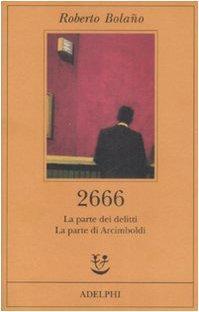Idioma Italian
Publicado el 17 de diciembre de 2008

Idioma Italian
Publicado el 17 de diciembre de 2008
2666 is the last novel by Roberto Bolaño. It was released in 2004, a year after Bolaño's death. Its themes are manifold, and it revolves around an elusive German author and the unsolved and ongoing murders of women in Santa Teresa, a violent city inspired by Ciudad Juárez and its epidemic of female homicides. In addition to Santa Teresa, settings and themes include the Eastern Front in World War II, the academic world, mental illness, journalism, and the breakdown of relationships and careers. 2666 explores 20th-century degeneration through a wide array of characters, locations, time periods, and stories within stories. Over 1100 pages long in its Spanish edition, and almost 900 in its English translation, it is divided into five parts. An English-language translation by Natasha Wimmer was published in the United States in 2008, by Farrar, Straus and Giroux, and in the United Kingdom in 2009, by Picador. It …
2666 is the last novel by Roberto Bolaño. It was released in 2004, a year after Bolaño's death. Its themes are manifold, and it revolves around an elusive German author and the unsolved and ongoing murders of women in Santa Teresa, a violent city inspired by Ciudad Juárez and its epidemic of female homicides. In addition to Santa Teresa, settings and themes include the Eastern Front in World War II, the academic world, mental illness, journalism, and the breakdown of relationships and careers. 2666 explores 20th-century degeneration through a wide array of characters, locations, time periods, and stories within stories. Over 1100 pages long in its Spanish edition, and almost 900 in its English translation, it is divided into five parts. An English-language translation by Natasha Wimmer was published in the United States in 2008, by Farrar, Straus and Giroux, and in the United Kingdom in 2009, by Picador. It is a fragmentary novel. Critical reception of the novel has, on the whole, been very positive. In Chile, it won the Altazor Award in 2005. The New York Times Book Review included it in the list of "10 Best Books of 2008"; Time named it Best Fiction Book of 2008; and the novel won the 2008 National Book Critics Circle Award for Fiction. Wimmer's translation was nominated for the Best Translated Book Award. Critics have compared it to W. G. Sebald's works and praised the book's multiple story lines and scope.